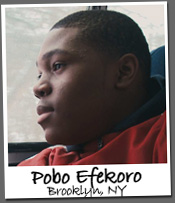My name is Oghenakpobo Efekoro, but most people call me Pobo. I am a 15-year-old sophomore at Forest Hills High School, but I’m better known for being an alumnus of Brooklyn, New York’s I.S.318, which has the best junior high school chess program in the United States. It was an honor and a privilege to be a member of that team for the three years I was a student at 318. We won some championships and worked hard to be the best. But even as we racked up titles year after year and filled showcases with first place trophies, it became increasingly hard for 318 to send us to nationals. The team grew used to hearing a reoccurring term—“budget cuts”—and we quickly learned that they could keep us from competing outside the city and state. It wasn’t long before that phrase—“budget cuts,” the most dreadful and repeated words I heard in my last two years at 318—would catch up to us. It was my second year on the team when the school announced it could no longer afford to pay for our travel to chess competitions. We persevered, driven by our love of chess, and sold candy to make up the difference. In December 2008, the 25 of us marched into nationals in Orlando, Florida. Even facing the dispiriting fiscal crisis, we showed the city and state of New York how you respond to a budget cut. That’s persistence and success. The team swept the middle school sections, winning the sixth, seventh and eighth grade—every possible section we were eligible to win! We succeeded despite the challenges and the obstacles presented to us. The next year—my last at 318—I decided to run for school president to fight that dreadful reoccurring term, “budget cuts.” I won, and was determined to stand up not just for my colleagues on the chess team, but to make sure none of the 1,600 students who walked the halls of 318 would suffer from those awful cuts anymore. I felt empowered and confident that I could end the cuts at our school. I believed I had a moral obligation to make sure that every student got the best education possible. There were a number of times when Mr. Rubino, then principal of 318 and now superintendent of the school district, had to tell the chess team, “You might not be going to nationals. The school has really been hit hard by budget cuts.” It was such a deflating feeling to know that we –the hardest working chess team in the nation—might not get to compete because we didn’t have the money. But we kept our heads up. We sold even more candy. And when we went to nationals in Dallas, Texas, in December 2009, we again did what we do best: We won. 318 earned three national titles, decisively defended our sixth- and seventh-grade championships, and recaptured the K-6 blitz speed chess title. My team, the eighth graders, lost the section but put up a heck of a fight, becoming the highest scoring eighth grade chess team in the history of 318. Despite the budget cuts, we still won. But in the months after we got back from nationals, the school was hit with another budget cut, right in the middle of the school year. While other schools suffered a 1.6 percent cut, 318 saw a 2.8 percent cutback, one so deep it threatened to discontinue many of the afterschool programs—including chess—which make 318 special. This was unacceptable. So parents and staff, along with the student government, got together and fought to keep the programs we knew were so vital to the 318 community. We sent hundreds and hundreds of emails to Joe Klein, then New York City Schools Chancellor. I think we broke his phone! And in the end, we got the school’s money back. But we wondered why we had to fight so hard to protect our educations, or how the city could so easily put a price on something we’d been taught was so priceless. I’m now an assistant chess coach with the 318 chess team. I get to wake up every Saturday morning to take the new generation of 318ers to tournaments and analyze their games. They keep getting shorter, or maybe I’m just getting taller. The kids are great players, getting stronger by the day, but I still see the effects of annual budget cuts on their hard work. And still, 318 struggles to send its players to compete, even as it helps them to be the best they can be. Education is not a bargaining chip to be used by politicians. It is a necessity that ensures the next generation can excel in an increasingly competitive world. It is a pathway, a gateway to success. Everything begins with a good education—and that means every aspect of education, including extracurricular activities and learning programs that happen after the “school day” has ended. Budget cuts tear through districts, forcing schools to do away with programs like the 318 chess team, a success story by any measure with more than 30 national titles, the most decorated middle school chess team the United States has ever seen, and a group that continues to win despite the economic challenges they face. I hope that one day, when I am successful in a presidential run for the second time in my life, I can look back and realize that I’ve made the phrase “budget cuts” obsolete. Until then, I hope you’ll join me in a show of support for afterschool and other quality learning programs that are changing lives every day—and I should know, because they’ve changed mine. Increase and protect funding for afterschool programs. Our country’s students—and our country’s future—are depending on it. Add your name to Pobo’s petition to protect afterschool funding. |








